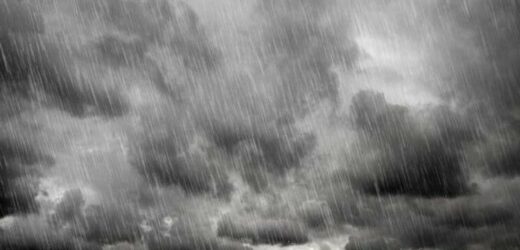Met Office forecasts rain across UK
We use your sign-up to provide content in ways you’ve consented to and to improve our understanding of you. This may include adverts from us and 3rd parties based on our understanding. You can unsubscribe at any time. More info
Over the last 50 years, a weather, climate, or water-related disaster has struck somewhere in the world every day on average. Because of hotter temperatures, these extreme events have gone up five-fold over the past half-century, scientists say. But, according to a new study led by the Met Office and the University of Reading, the Victorians also suffered a period of extreme weather events.
The new data can give us better insights into the extreme changes that we are experiencing today, experts have said.
The Rainfall Rescue project, launched by the University of Reading back in March 2020, recruited 16,000 volunteers helped to digitally transcribe 130 years’ worth of handwritten rainfall observations from the Met Office archives.
They managed to digitise 5.2 million observations in just 16 days.
It was discovered that the wettest year on record is 1872, with a staggering1065mm rainfall that year.
1855 was the driest year on record in the UK, with just 786.5mm of rainfall.


The driest May on record is now May 1844, when just 8.3mm fell in England.
Until this new data had been uncovered, May 2020, (9.6mm of rainfall in England) was the driest May on record.
The records also revealed that November 1852 is the wettest ever month on record for most of southern England.
And it is the third wettest month on record for Cumbria (364.9mm of rainfall).
During this time there were a series of floods in various spots around the country, dubbed the Duke of Wellington Floods because they began around the time of his state funeral in London.

Professor Ed Hawkins, a climate scientist at the University of Reading and Rainfall Rescue project lead, said: “I am still blown away by the response this project got from the public.
“Transcribing the records required around 100 million keystrokes, yet what I thought would take several months was completed in a matter of days.
“Thanks to the hard work of the volunteers, we now have detailed
accounts of the amount of rain that fell, back to 1836, as seen through the eyes of other dedicated volunteers from several generations ago.
“To put that in context, 1836 was the year Charles Darwin returned to the UK on the Beagle with Vice-Admiral Robert Fitzroy, and a year before Queen Victoria took to the throne.”
“As well as being a fascinating glimpse into the past, the new data allows a longer and more detailed picture of variations in monthly rainfall, which will aid new scientific research two centuries on.
DON’T MISS
Putin bowel cancer speculation fuelled by ‘Moon face’ fears [INSIGHT]
UK to avoid Putin’s EU energy wrath as huge new gas field found [REPORT]
Energy crisis: New green scheme promises to save up to £350-a-year [REVEAL]


“It increases our understanding of weather extremes and flood risk across the UK and Ireland, and helps us better understand the long-term trends towards the dramatic changes we’re seeing today.”
Dr Mark McCarthy, head of the Met Office’s National Climate Information Centre, said: “The UK rainfall record is notoriously variable, with extremes of weather presenting us with drought and floods.
“The more we can shine a light into the earlier chapters and extremes within the rainfall record, the better we are able to understand the risks presented to us by climate change and future extreme weather events.”
The Met Office records rainfall using rain gauges which usually consist of a circular collector, with a funnel to channel the collected rain into a measuring mechanism.
Different types include tipping buckets, storage rain-gauges, and automated rain gauges.
Source: Read Full Article


